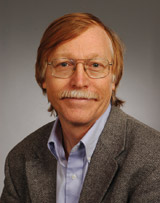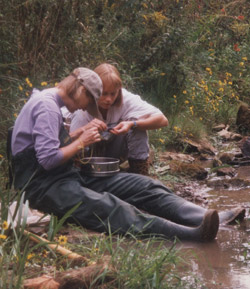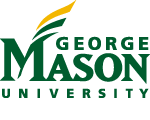Gifts to Mason Advance Environmental Studies
By Denise St.Ours
Whether it’s memorializing an individual’s love of nature or providing critical resources to further scientific research, private support provides important opportunities in environmental preservation and protection—and helps educate the next generation of ecologically responsible citizens.
Tributes Heighten Awareness
For Michele Souza, BIS ’02, establishing a scholarship endowment to assist undergraduate students studying environmental science and policy was an ideal way to honor the memory of her late husband, John.
“Throughout his lifetime, John found enjoyment and relaxation in the simple pleasures that nature provides—fishing, diving, hunting, open spaces, and glorious views,” explains Souza, a former Mason staff member. “I hope this endowment will assist someone who shares this appreciation and will endeavor to ensure that places like these will be preserved for future generations.”
The John Souza III Scholarship Endowment distributed its first award last year to Ruth DiMaria, BS Biology ’07 and BS Earth Science ’07, who graduated magna cum laude. Following her passion for the environment, DiMaria is pursuing a career in marine conservation.
Another memorial endowment, the Francis D. Heliotis Graduate Research Award, provides environmental science students the tools necessary for supporting their thesis or dissertation work in the field. The award was initiated in tribute to Heliotis, a wetlands ecologist and associate professor in Mason’s Biology Department who died in 1994 while on sabbatical conducting field work in the Pacific Ocean. The award has been funded over the years by alumni, faculty, family, and friends.

Chris Jones
Other gifts targeted to educating the next green generation include a legacy commitment from Chris Jones, chair of Environmental Science and Policy (ESP), a department within the College of Science. He has pledged to provide funding from his estate to create an award for graduate research in the area of freshwater ecology at ESP.
“Mason is committed to advancing green initiatives on campus and has provided me a lot of opportunities to pursue my goals as a scientist,” says Jones. “This is my way of helping students and giving back.”
Resources for the Future

LeAnne Astin, MS Biology ’00, and Cynthia Smith, PhD Environmental Science and Public Policy ’05, check a sample of stream water.
According to Jones, ESP has been the beneficiary of a number of gifts that are helping to explore new ways to mitigate the effects of man’s activities on the environment. (See related story for one example.)
Other gifts have come in the form of equipment and supplies. Last year, ESP received a 33-foot inboard power boat donated by Stephen Caruthers, a friend of the university. Valued at nearly $160,000, the vessel provides access for ecological experimentation and education along the Potomac River. It is being used for small field classes and research cruises to measure water quality and conduct plant and marine life tests. The boat is moored at the Belmont Bay Marina near the mouth of the Occoquan River.
More recently, ESP received a fence valued at more than $15,000 from Long Fence to protect a planned wetland mesocosm compound and ecological observatory area for lab and field classes and student and faculty research. The one-acre site, located near the intramural fields on the Fairfax Campus, will house multiple stock tanks simulating small-scale wetlands. Under the direction of ESP assistant professor Changwoo Ahn, the tanks will be subjected to different treatments of vegetation, soil, water regimen, and fertilization to study wetland functions and related environmental issues.
Green Naming Opportunities Abound
Whether through a scholarship, program, faculty position, building, or portion of a building, donors can use named gift opportunities to advance Mason’s environmental efforts. These special gifts, which may honor an individual, family, or entity, range from $10,000 for a library acquisition to $10 million plus for an entire facility. For more information about how named gifts can make a difference, visit supportingmason.gmu.edu/waystogive/named or call the Office of University Development at 703-993-8850.

